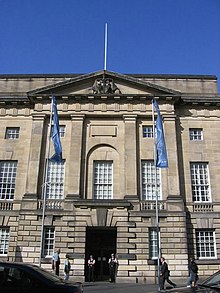College of Justice
| Supreme Courts of Scotland | |
|---|---|
| College of Justice | |
 | |
| Established | 1532 |
| Location | Edinburgh |
| Composition method | Executive selection |
| Authorised by | Judges are appointed by the monarch on the recommendation of the First Minister, who receives recommendations from the Judicial Appointments Board for Scotland[1] |
| Lord President and Lord Justice General | |
| Currently | The Rt Hon Lord Gill |
| Since | 2012 |
| Jurist term ends | 2017 |
| Lord Justice Clerk and President of the Second Division of the Inner House | |
| Currently | The Rt Hon Lord Carloway |
| Since | 2012 |
| Jurist term ends | 2024 |

The College of Justice includes the Supreme Courts of Scotland, and its associated bodies.
The constituent bodies of the national supreme courts are the Court of Session, the High Court of Justiciary, and the Office of the Accountant of Court.[2] Its associated bodies are the Faculty of Advocates, the Society of Writers to Her Majesty's Signet and the Society of Solicitors in the Supreme Courts of Scotland.
The College is headed by the Lord President of the Court of Session, who also holds the title of Lord Justice General in relation to the High Court of Justiciary, and judges of the Court of Session and High Court are titled Senators of the College of Justice.
History
The College was founded in 1532 by King James V following a bull issued by Pope Clement VII on 15 September 1531. It provided for 10,000 gold ducats to be contributed by the Scottish bishoprics and monastic institutions for the maintenance of its members, one half of whom would be members of the "ecclesiastical dignity".[3]
The Parliament of Scotland passed an Act on 17 May 1532 authorising the creation of the college with 14 members, half spiritual, half temporal, plus a president and the Lord Chancellor. The college convened for the first time on 27 May 1532, in the royal presence.
Supplementing the 14 ordinary lords, who were called Senators, were an indefinite number of supernumerary judges called extraordinary lords.
The founding members of the College of Justice were:
- The Lord Chancellor, Gavin Dunbar, Archbishop of Glasgow
- The Lord President, Alexander Myln, Abbot of Cambuskenneth
- Richard Bothwell, Rector of Ashkirk
- John Dingwell, Provost of Trinity College
- Henry White, Rector of Finevin
- William Gibson, Dean of Restalrig
- Thomas Hay, Dean of Dunbar
- Robert Reid, Abbot of Kinloss
- George Ker, Provost of Dunglass
- Sir William Scott of Balweary
- Sir John Campbell of Lundy
- Sir James Colville of Easter Wemyss
- Sir Adam Otterburn of Auldhame and Redhall, King's Advocate
- Nicholas Crawford of Oxengangs
- Francis Bothwell of Edinburgh (brother of Richard)
- James Lawson of Edinburgh
- Sir James Foulis of Colinton, who was added at the first meeting of the court when the king made him a "Lord of the Session".
The College at its foundation dealt with underdeveloped civil law. It did not dispense justice in criminal matters as that was an area of the law reserved to the King's justice, through the justiciars (hence the High Court of the Justiciary), the Barony Courts and the Commission of Justiciary. The High Court of Justiciary was only incorporated into the College of Justice in 1672.
Initially, there was little legal literature. Acts of the Parliament of Scotland and the books of the Old Law as well as Roman Law and Canon law texts were about all to which the pursuer and defender could refer. It was only after the establishment of the court that this situation improved, with judges noting their decisions in books of practicks.
The Treaty of Union 1707 with England preserved the Scottish Legal System. Article XIX provided "that the Court of Session or College of Justice do after the Union and notwithstanding thereof remain in all time coming within Scotland, and that the Court of Justiciary do also after the Union ... remain in all time coming."
See also
| Part of a series on |
| Scots law |
|---|
 |
- Senator of the College of Justice
- Historic List of Senators of the College of Justice
- Extraordinary Lord of Session
- Principal Clerk of Session and Justiciary
References
- ^ "Judicial Appointments - How are judges appointed?". Judiciary of Scotland. Edinburgh: Judicial Office for Scotland. Retrieved 27 May 2012.
- ^ PDF-file - "The Supreme Courts are made up of: the Court of Session, the High Court of Justiciary and the Accountant of Court's Office" - Scottish Court Service, accessed 12 March 2007
- ^ The 1531 bull stipulated that of the senators "media pars in dignitate ecclesiastica constituta omnino esse debeat"; a March 1534 bull of Pope Paul III added "'pro uno Presidente semper prelate ecclesiastico". Baird Smith, David (1912), "The Reformers and divorce", The Scottish historical review, 9, Glasgow: James Maclehose & Sons: 12–13
